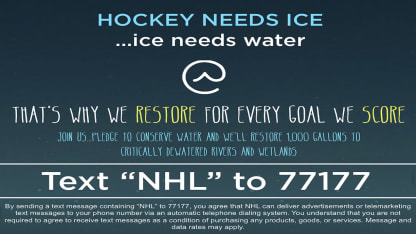The National Hockey League counterbalanced the water and carbon footprint of the 2015-16 Stanley Cup Final, restoring approximately 1,075,698 gallons of water to the Colorado River and purchasing sufficient carbon offsets and renewable energy certificates (RECs) from Constellation - the NHL's Preferred Energy Provider - to cover emissions resulting from the two arenas and team travel. The RECs support wind energy, while the offsets support methane recapture from landfills. The NHL's investment in these environmental assets support ongoing work to reduce emissions of our operations through better, cleaner practices and technologies.
The NHL also engaged with fans through a text-to-pledge water restoration campaign, collaborating with Bonneville Environmental Foundation (BEF) and
Change the Course
, a platform connecting pledgers and corporate sponsors. The League promoted the campaign to its 4.82 million Twitter followers, committing to restore 1,000 gallons of water per pledge, resulting in an additional 231,000 gallons restored, thanks to fans.
NHL counterbalances water and carbon footprint
League buys offsets, restores water to Colorado River following Stanley Cup Final


















